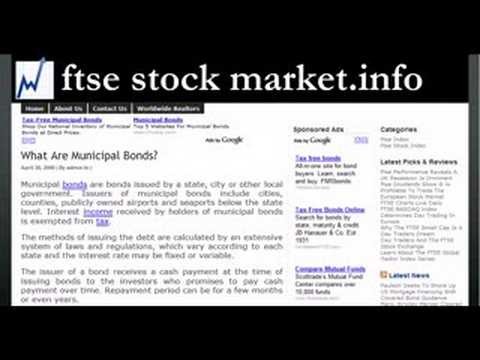Muni bonds Still safe and taxfree –
Post on: 30 Март, 2015 No Comment

By Mark McLaughlin, CNBC.com
Jefferson County. Ala.’s November decision to file for bankruptcy could have sent the municipal bond market into a frenzy. But just as the muni market fended off dire predictions of spiraling defaults during the height of the credit crisis, tax-exempt bond issuers have continued to hold their own through a recession and tepid recovery.
By Jeremy Woodhouse, Getty Images
Sponsored Links
Only three municipal bond issuers (out of a universe of about 50,000) have defaulted in 2011, according to ratings agency Standard & Poor’s. While reduced tax revenues put pressure on state and local government to meet their obligations, municipal bankruptcy is rarely an option for legal, financial, and practical reasons.
Debt service on municipal bonds tends to be one of the top spending priorities in state budgets, most of which must be balanced annually. Municipal interest and principal payments are not that onerous, representing less than 10% of total government spending in all but three states in 2010 by S&P’s count. Plus, the mere threat of not honoring their debt commitments could cause municipalities to lose the trust of investors, cutting off a vital funding source.
PHOTOS: World’s most secretive tax havens
STORY: Retired? Here’s how to cut your tax bill
MORE: Full coverage: Taxes, Investments & You
A muni default has to be a really poor situation,» says Tom Weyl, director of municipal research for fund manager Eaton Vance. There was a spike at the beginning of the recession due to project finance risk in community development districts in California and Florida. Most (issuers) that are going to default have already done so.
Budget crisis as wake-up call
In fact, market watchers say state and local budget crises have served as a wake-up call for municipal issuers to get their financial houses in order. Pension reform and other spending cuts combined with an expected rebound in tax collections have most state balance sheets in their strongest financial shape since the start of the recession in 2007. California, for instance, is slated to spend the lowest amount as a percentage of personal income since 1973.
States have done a much better job over last two to three years than in past economic downturns,» says Weyl. Addressing the problems was already going on when the over-hyped (default) predictions came out.
A stronger economy should lower defaults in general, but investors can further mitigate risk by focusing on a bond’s payment source.
General obligation municipal bonds that are backed by the taxing power of the issuer are a safer bet to honor payments than revenue bonds that rely on usage fees and other payments for services such as toll roads and airports.
Elle Kaplan of New York’s Lexion Capital Management recommends investing in bonds of municipalities providing essential services like water.
For investors convinced the municipal bond market is back on solid footing, these securities provide handsome tax advantages. Municipal bonds partially offset higher tax rates by sheltering interest income from federal income tax.
At the current top federal tax rate of 35%, a muni bond yielding 3.9% would produce the same tax equivalent yield as a taxable bond yielding 8%. In high tax states, owning muni bonds exempt from state and/or local taxes can offer even greater tax savings.
With tax rates most likely being raised in the future, more and more investors should look into municipal bonds,» says Nicholas Olesen, a wealth manager in King of Prussia. PA. The spread between the yields on municipal bonds and Treasuries is large and, if an investor is in, or will be in the future, a high tax bracket, municipal bonds should be used for non-qualified accounts.
Diversification
Diversifying across hundreds of municipal issuers through a mutual fund or exchange trade fund can provide a reliable tax-free income stream while preventing the default of one or several bonds from hurting overall investment performance. With an eye toward risk, here are several funds to consider that invest in municipal bonds across the U.S. Single-state muni bond funds and ETFs are also available that may offer additional tax advantages.
Fidelity Intermediate Municipal Income has held up better in down markets than similar funds by favoring higher quality bonds and those with call features. The Fund sports low expenses of 0.39% and a current tax-free yield of 3.43.
T. Rowe Price Tax-Free Short Term keeps volatility in check by owning a mix of high-rated bonds and higher-yielding securities of out-of-favor companies. That combination has produced consistent results with the Fund, which currently yields 2.21% tax free, landing in the top third of its category in eight of the past nine years.
For investors willing to take on greater interest-rate risk, Vanguard Long-Term Tax-Exempt generates a tax-free yield of 4.21% by holding bonds with longer maturities. Its rock-bottom expenses of 0.2% give it a big advantage in the current low yield environment.
On the ETF side, iShares S&P National AMT-Free Muni Bond features below-average volatility and a current tax-free yield of 2.66%. iShares also offers a series of ETFs with specific maturity dates over the next six years.
For more information about reprints & permissions. visit our FAQ’s. To report corrections and clarifications, contact Standards Editor Brent Jones. For publication consideration in the newspaper, send comments to letters@usatoday.com. Include name, phone number, city and state for verification. To view our corrections, go to corrections.usatoday.com.














